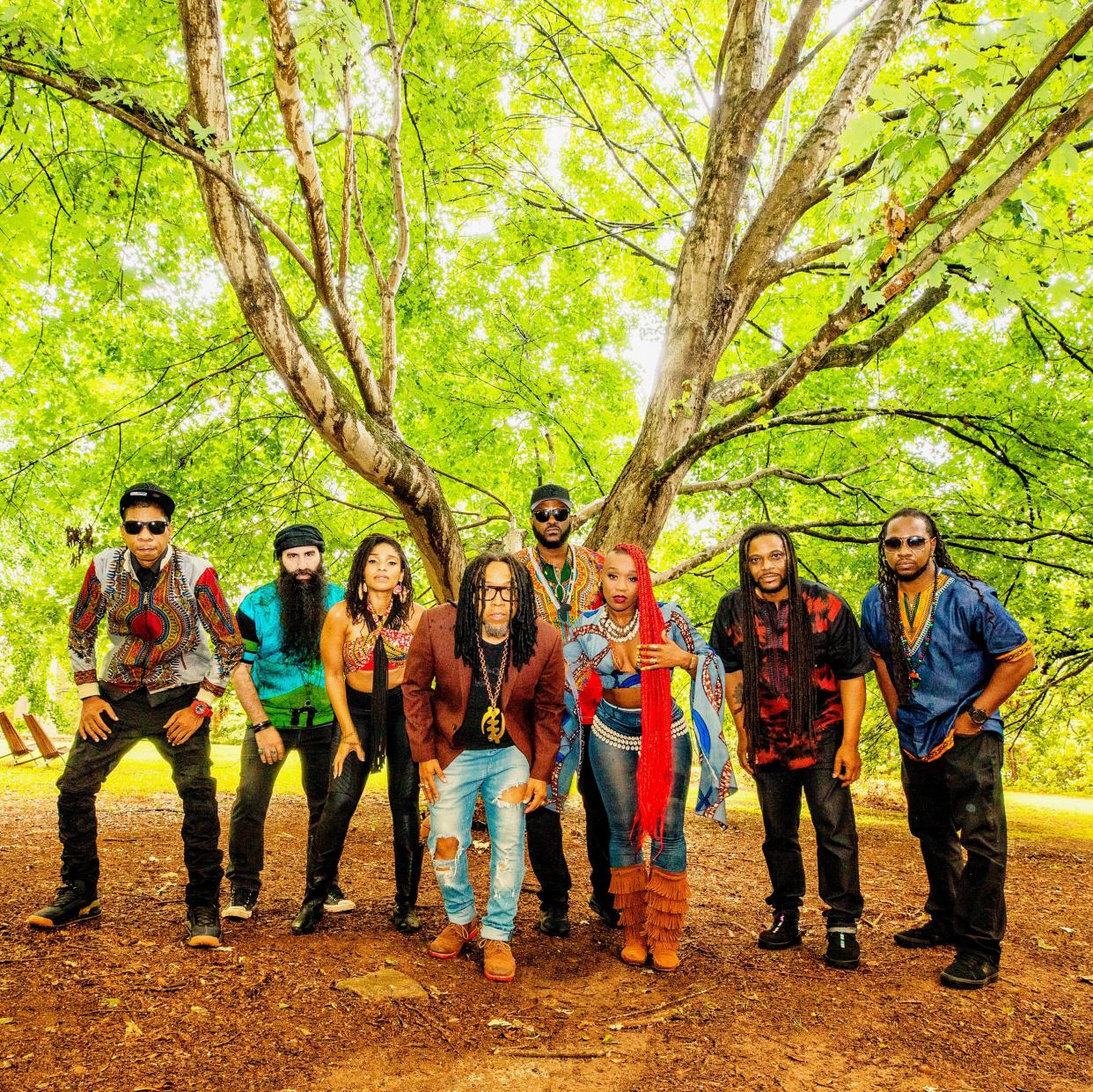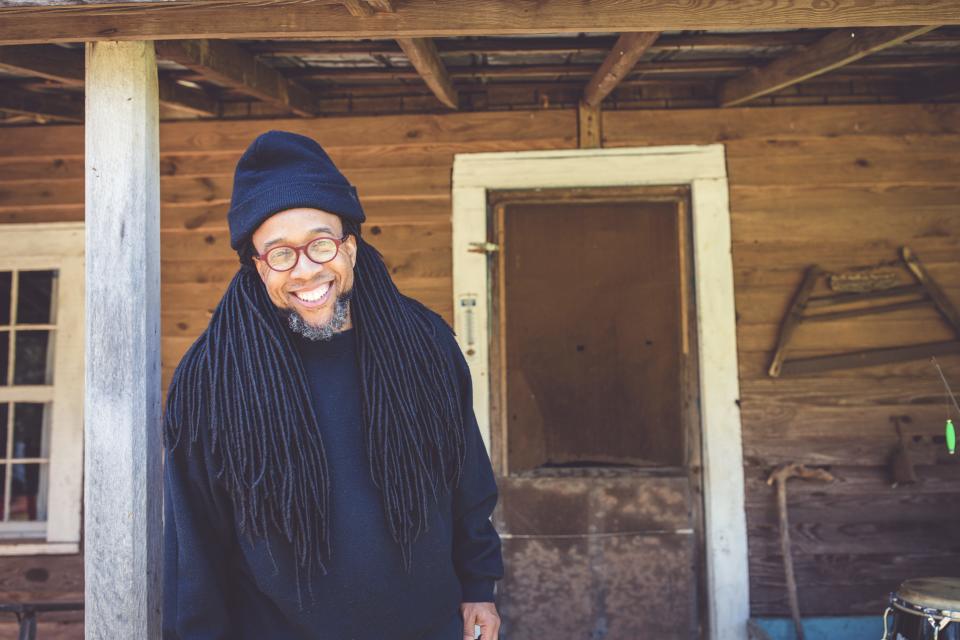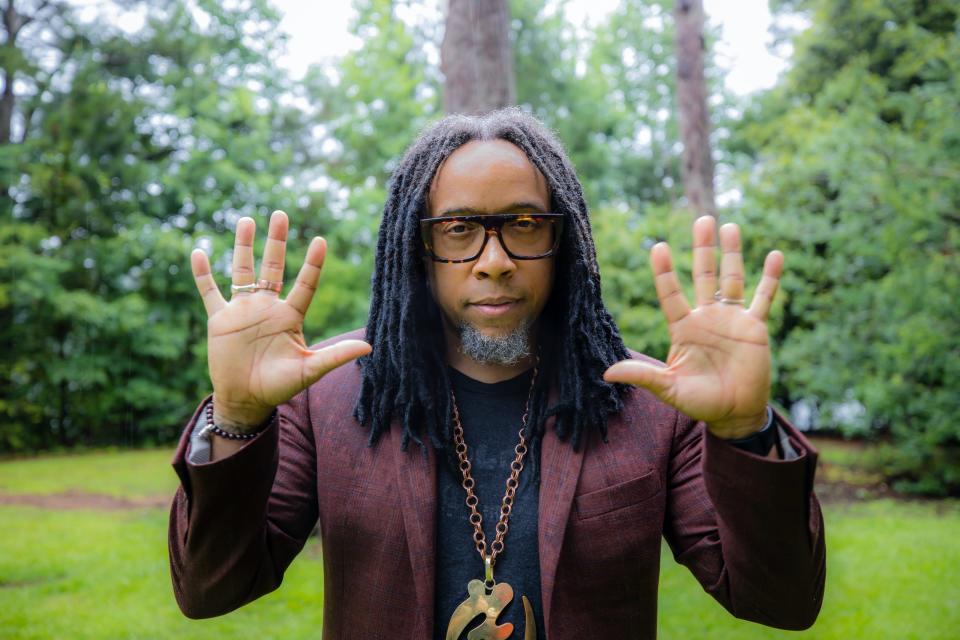How this 'bittersweet truth' launched rap icons Arrested Development to the masses

- Oops!Something went wrong.Please try again later.
It's been 30 years since Arrested Development dropped their Grammy-winning, multi-platinum breakthrough, "3 Years, 5 Months and 2 Days in the Life Of ..."
It was a trailblazing debut, from its eclectic brand of hip-hop to its lyrical focus on spirituality, peace, empowerment and consciousness.
They've been through a dizzying number of lineup changes through the years, with only Speech remaining from the lineup that recorded that iconic masterpiece.
But those same ideals inform their music to this day, as recently as last year's "For the (Expletive) Love," which opens with a song that asks, "When the hard stuff comes, will I rise up, can I handle it?"
A lasting message of empowerment
In a Zoom call from his studio in advance of their appearance Saturday, Sept. 24, at Sedona's VortiFest, Speech reflects on the lyrical thread that ties their work together.
"I personally think that's one of the best things about our group," he says.
"There's a through line of motivation. Of consciousness."
The main point of the latest album, he says, was to "boldly pronounce" their love of hip-hop culture, as the guest list clearly illustrates.
"We have tons of classic artists that we all respect," Speech says. "Big Daddy Kane, Monie Love, Fatman Scoop, Masta Ace, so many fantastic, legendary, legacy artists. The Sugar Hill Gang. That was our way of saying we love hip-hop music."
Interview: How tragedy helped Phoenix rapper Mega Ran embrace the positive
That's something Speech feels may have gotten lost in the translation in the early '90s.
"We sort of got tagged as alternative hip-hop," he says. "What that implies is that it's 'hip-hop,' but it's sort of an alternative to hip-hop. And for us, that wasn't enough because we never felt like we were trying to be a literal alternative to hip-hop."
They certainly intended to present a clear alternative to gangsta rap.
"We were being an alternative to the negative lyrics of literally talking about killing each other," he says. "Of literally talking about selling drugs to one another, literally talking about just gross materialism, degrading Black women. That's what we wanted to be an alternative to. Not hip-hop in general."
The 'bittersweet truth' of 'Tennessee'
Speech knew they had created something truly special with that first release.
"I love hip-hop enough to know what the rest of the competition and other artists were doing," he says.
"And I was like, 'This is special. It deserves to be heard. I hope and pray the rock gods or whatever you want to call it will bless this record with the opportunity. Because if it gets heard, I feel like it should do quite well.'"
He wasn't expecting the level of success it went on to enjoy. By 1995, "3 Years, 5 Months and 2 Days in the Life Of ..." had been certified quadruple-platinum, having sent three singles to the Top 10 on the Billboard Hot 100.
The song that got the whole thing rolling was the last song they recorded.
"Tennessee" hit No. 6 on Billboard's Hot 100, topped the hip-hop charts, won a Grammy and was chosen as one of "500 Songs That Shaped Rock and Roll" by the Rock and Roll Hall of Fame.
'Funky Broadway': How 1 night at a Phoenix Elks Club changed the history of funk
"That song is a bittersweet truth," Speech says.
They had been planning to release another of those Top 10 singles, "Mr. Wendal," first.
"Then my grandmother passed," Speech says.
"I spent all my summers in Tennessee with my grandmother, and it was the most formative years of my entire life. It's the basis of who I am as a human being. So when she passed, it was just huge as far as the hole in my heart."
That same week, he lost his brother.

"At that point, my world was just literally devastated," he recalls.
"I can't explain how horrible things were. And that song was a representation of the last time I saw both of them. In Tennessee. My brother was at my grandmother's funeral. And when I wrote the song, the lyrics just poured out of me, almost like a freestyle."
At that point, all he had to do was talk the label into holding off on "Mr. Wendal."
"First of all, I thought the song was powerful," he says. "I also thought it was a great song to introduce this kind of group. I was rapping melodically which had not been, to my knowledge, done in hip-hop to the extent that I did it."
The Arrested Development backlash
"3 Years, 5 Months and 2 Days in the Life Of ..." went on to be voted album of the year in the Village Voice annual Pazz & Jop poll and landed Arrested Development on the mainstage at Lollapalooza in 1993.
At the same time, it was written off by some as being anti-hip-hop.
"It frustrated me because it's the opposite of what our intent is," Speech says. "So to see us sort of get marginalized within not only the hip-hop world, but even within the Black community, was just surreal for me."
He has his theories on what caused that situation.
"We were getting so much adulation and love from pop culture, and whenever that happens, your sort of base, especially Black culture, starts to feel like it's not theirs," he says.

The Weeknd's Phoenix concert was an epic, post-apocalyptic hellscape. Why that was awesome
After being named Rolling Stone's Band of the Year and winning Best New Artist and Best Rap Performance by a Duo or Group at the Grammys, Arrested Development began to feel the industry lose interest in their brand of conscious rap.
He saw the same thing happening to kindred spirits such as Public Enemy, KRS-One and A Tribe Called Quest.
"These artists were being strategically taken away from the limelight despite us selling millions and millions of records, and replaced with more what I'll call gangsta or ignorant rap," Speech says.
He blames a lack of comfort with the themes those conscious rappers were addressing.
"Whether it's the Black Panthers or Marcus Garvey or Pan-Africanism, these are terms and ideologies that a lot of white America just simply doesn't understand," he says. "It goes over their head. So that's part of it."
Why gangsta rap is an easier sell
The other part, he says, is how Black entertainers are perceived by white America — as only entertainers.

"You know, big butts and talking about the ghetto and we got slang and we're dancing well," he says. "That's all good. That's entertainment. It's fun."
Even gangsta rap is seen as fun.
"Because for white America, there's nothing real about that," Speech explains. "To them, the guy with the gun and the drug-dealer thing is just a little peer into a world most of them don't understand too much. It's cute. For us, it's obviously real life and real family members dying, real people getting shot down on the streets."
He points to PnB Rock's murder in Los Angeles three days before this interview.
"For so many in white America, that's just 'those guys over there.' It's almost like a Schwarzenegger film. They don't live that in their actual neighborhoods on a daily basis."
Duran Duran interview: Roger Taylor on how they avoided being written off in history as a teen band
A message across generations
Conscious Black music is holding people more accountable, he says.
"And that's not as comfortable. Nor is it as entertaining."
The brand of conscious rap he does came naturally to Speech.
"My mother owns the largest Black newspaper in Wisconsin," he says. "And being around the issues of the Black community and seeing what people are struggling with empowered me to want to publish music just like how she publishes newspapers."
Speech's dad was an entrepreneur who taught him the value of self-determination and community.
"I think it really had a profound impact on what I would want to rhyme about, and if I started a group, what I would want that group to be like," he says.
He points to Baba Oje, Arrested Development's "spiritual elder," who died in 2018 of leukemia and was 57 — older than Speech is now — when they recruited him.
"I was inspired by understanding the fact that the elders desperately wanted to speak to the youth," Speech recalls. "And unfortunately, because of Western culture's standards, there was this divide."
At a certain point in rolling out this latest effort, Speech was saying it would likely be their final album. Now he's not so sure.
"I'm 53," he says.
"I wanted to retire. But I simply can't. Monetarily, it just doesn't make sense to retire right now. So that's the main reason I haven't. The second reason is there's still a lot of passion, a lot of feelings of excitement."
Arrested Development at VortiFest
With: G. Love & Special Sauce, the Yawpers, Phoenix Afrobeat Orchestra, Banana Gun, Adam Bruce, Damiyr and decker.
When: 7 p.m. Friday, Sept. 23; 11 a.m. Saturday, Sept. 24 (Arrested Development play Saturday).
Where: Sedona Red Rock High, 995 Upper Red Rock High Loop Road, Sedona.
Admission: $25 Friday; $66 Saturday; $90 two-day pass.
Details: vortifest.ticketleap.com/vortifest-music-festival-experience/
Reach the reporter at ed.masley@arizonarepublic.com or 602-444-4495. Follow him on Twitter @EdMasley.
Support local journalism. Subscribe to azcentral.com today.
This article originally appeared on Arizona Republic: Speech of Arrested Development talks 30 years of conscious rap

